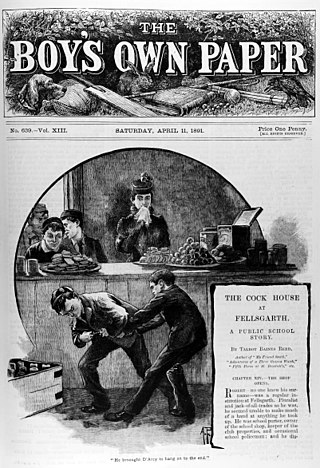
Norman Percevel Rockwell was an American painter and illustrator. His works have a broad popular appeal in the United States for their reflection of the country's culture. Rockwell is most famous for the cover illustrations of everyday life he created for The Saturday Evening Post magazine over nearly five decades. Among the best-known of Rockwell's works are the Willie Gillis series, Rosie the Riveter, The Problem We All Live With, Saying Grace, and the Four Freedoms series. He is also noted for his 64-year relationship with the Boy Scouts of America (BSA), during which he produced covers for their publication Boys' Life, calendars, and other illustrations. These works include popular images that reflect the Scout Oath and Scout Law such as The Scoutmaster, A Scout Is Reverent and A Guiding Hand, among many others.

Ernest Thompson Seton was an English-born Canadian-American author, wildlife artist, founder of the Woodcraft Indians in 1902, and one of the founding pioneers of the Boy Scouts of America (BSA) in 1910.
Caravan or caravans may refer to:
Top Secret generally refers to the highest acknowledged level of classified information.
Traveler(s), traveller(s), The Traveler, or The Traveller may refer to:
Life is the characteristic that distinguishes organisms from inorganic substances and dead objects.
A boy is a human male child or young man.
Blueboy, Blue Boy, or Blues Boy or Blue Boys may refer to:

Scout Life is the monthly magazine of the Boy Scouts of America (BSA). Its target readers are boys and girls between the ages of 6 and 18. The magazine‘s headquarters are in Irving, Texas.

Follow Me, Boys! is a 1966 American drama film produced by Walt Disney Productions. It is an adaptation of the 1954 novel God and My Country by MacKinlay Kantor and was the final live action film produced by Walt Disney, who died two weeks later. The film stars Fred MacMurray, Vera Miles, Lillian Gish, Charles Ruggles and Kurt Russell, and is co-produced by Walt Disney and Winston Hibler, directed by Norman Tokar and written by Louis Pelletier. It is one of the few films featuring the Boy Scouts of America and is Disney's paean to the Boy Scouts. The title song "Follow Me, Boys!" was written by studio favorites Robert and Richard Sherman. After the film's production, the Boy Scouts of America considered using the song as their anthem, but efforts toward the end were dropped. The Boys' Life magazine included a teaser article of the film. Follow Me, Boys! was the first of ten Disney films in which Russell appeared over the next ten years. A DVD version was released on February 3, 2004 by Walt Disney Home Entertainment, although it is in 4:3 pan and scan format, not the original 1.66:1 wide screen aspect ratio.

The Boy's Own Paper was a British story paper aimed at young and teenage boys, published from 1879 to 1967.

Since Scouting began in 1907, it has entered into many elements of popular culture, including movies, TV and books.
The Heinlein juveniles are the science-fiction novels written by Robert A. Heinlein for Scribner's young-adult line. Each features "a young male protagonist entering the adult world of conflict, decisions, and responsibilities." Together, they tell a loosely connected story of space exploration. Scribner's published the first 12 between 1947 and 1958, but rejected the 13th, Starship Troopers. That one was instead published by Putnam. A 14th novel, Podkayne of Mars, is sometimes listed as a "Heinlein juvenile", although Heinlein himself did not consider it to be one.
Lost Boy or Lost Boys also refer to:

Magazines intended for boys fall into one of three classifications. These are comics which tell the story by means of strip cartoons; story papers which have several short stories; and pulp magazines which have a single, but complete, novella in them. The latter were not for the younger child and were often detective or western in content and were generally greater in cost. Several titles were published monthly whereas the other two categories were more frequent.
Shōnen, shonen, or shounen is the Japanese word for "boy" or "minor".
The New England Boy Scouts (NEBS) was an early American Scouting organization that split off from the American Boy Scouts in 1910 and merged with the Boy Scouts of America by 1916.
Pedro is a masculine given name.
(The) Boy(s) Next Door may refer to:
This page is based on this
Wikipedia article Text is available under the
CC BY-SA 4.0 license; additional terms may apply.
Images, videos and audio are available under their respective licenses.






